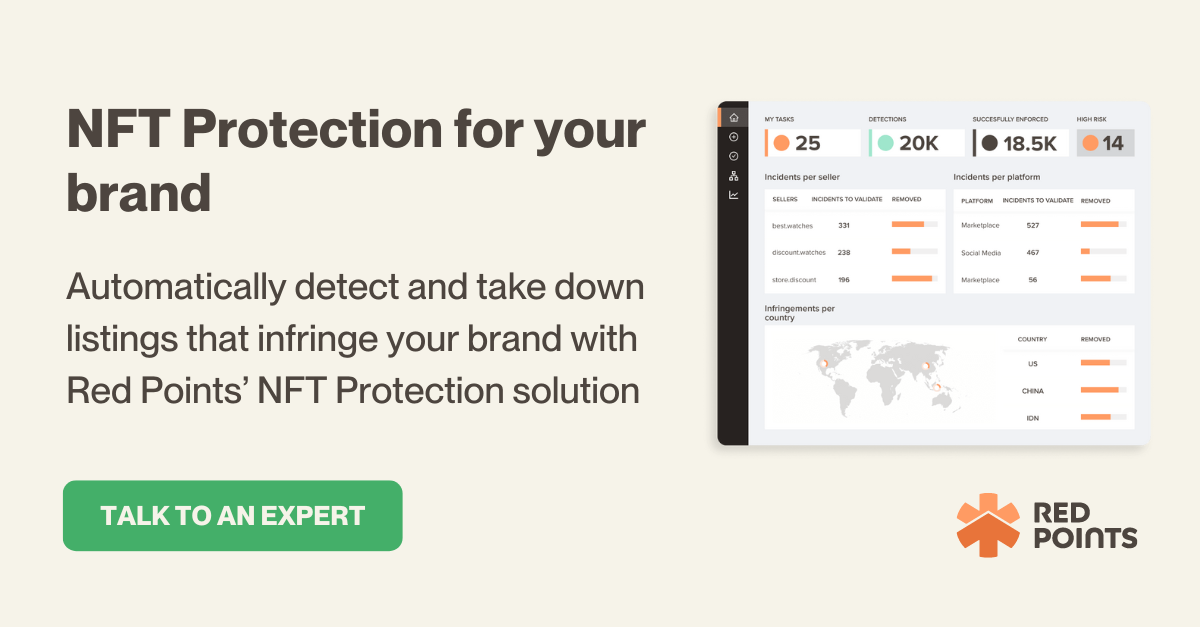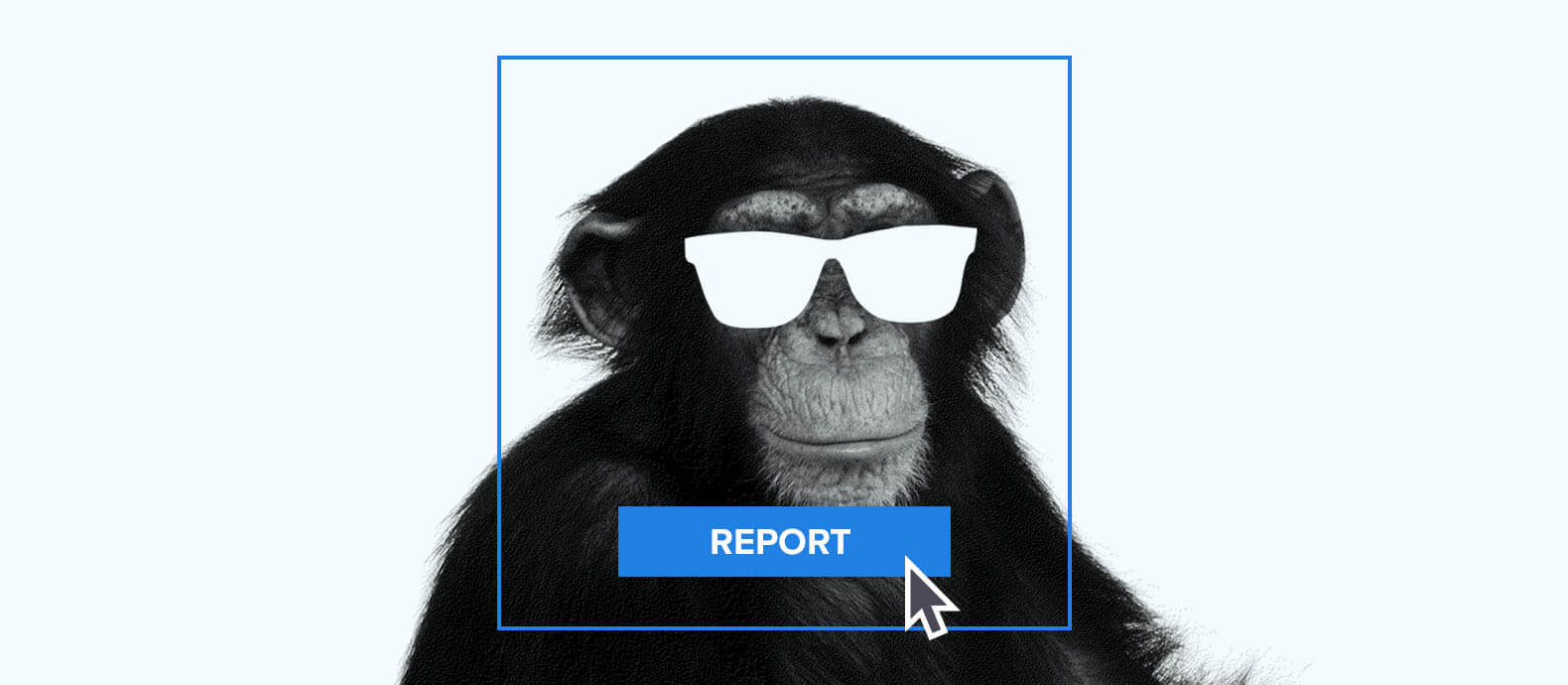Around 15,000 to 50,000 Non-Fungible Token (NFT) sales occur every week. Some of these sales will involve NFTs that may have the potential to infringe on your business’s registered intellectual property (IP). This is because NFTs usually involve some kind of art and the ownership of creative and artistic works around the world is governed by copyright law.
So, what can you do if you are a victim of NFT copyright infringement? And how do you protect your brand against future instances of IP misuse and NFT art theft? In this blog, we’ll be exploring NFT copyright infringement, and you can mitigate the impact it has on your business, by delving into a number of key topics including:
- What is NFT copyright infringement?
- What are common types of NFT copyright infringement?
- Relevant Intellectual property rights as they apply to NFT copyright infringement
- Impact of NFT copyright infringement on brands
- Protecting against NFT copyright infringement
What is NFT copyright infringement?
NFT copyright infringement is when an individual mints an NFT without having the intellectual property rights to reproduce, communicate, or sell the work to the public. When NFTs use artwork stolen from artists then the original creator will have the ability to sue the NFT creators as long as the creator has registered their copyright at the relevant organization e.g. the U.S. Copyright Office.
As a result of the proliferation of NFTs in recent years, all digital content owners and business decision-makers will need to be extra vigilant to ensure their IP rights are not being violated. This can be difficult for individuals and small businesses to monitor, especially if they have a limited understanding or exposure to the world of NFTs.
It is especially important to be vigilant because many NFT buyers believe they have acquired the underlying work of art and all its accompanying rights. Whereas, they are really only buying the metadata associated with the work and therefore not the work itself.
What are common types of NFT copyright infringement?
- Unauthorized reproduction
Some instances of NFT copyright infringement occur because someone has reproduced a piece of copyrighted material via an NFT without authorization. This is a reasonably common occurrence because many minters and buyers within the NFT community are not entirely aware of how their NFTs may relate to original creative works.
This is a relatively new area of copyright law and legislation on the matter is constantly evolving in legal jurisdictions around the world. Nevertheless, if you believe that an NFT may be infringing your brand’s IP through unauthorized reproduction you should definitely take note of this.
- Unauthorized distribution
Another common area of copyright trouble involves the authorized distribution of copyrighted material. Under US copyright law, one is not allowed to distribute copyrighted content without the permission of the copyright owner.
NFT creators are sometimes not aware that they can infringe a copyright not only by copying it but by passing that copy on to someone else. As so much of the NFT industry revolves around the transfer and distribution of NFTs via online platforms this has become a potential common area for NFT copyright infringement.
- Plagiarism and counterfeit NFTs
Other common types of NFT copyright infringement involve plagiarism and counterfeiting. This occurs when bad actors intentionally copy content protected by IP rights to use in the production of NFTs.
These kinds of infringement are often more malicious as they give no credit to the original creator and they attempt to mislead the buyer of the NFT as well. This has the potential to devalue your IP and impact the reputation you have built around your brand’s image and content.
- Adapting copyrighted content for use in NFTs
An adaptation is when a work is moved from one format to another. Despite being in a different format the work is essentially the same as the original. Therefore, one cannot create or distribute an adaptation of a copyrighted work without permission from the copyright owner.
Beyond outright plagiarism or straightforward reproduction, some individuals will try to add value to their NFTs by adapting copyrighted content and including that slightly altered content in their NFT designs. However, copyright law prevents the unauthorized adaptation of copyrighted work. Thus, businesses should be wary of how their copyrighted content can be adapted into new formats for use in NFTs.

Relevant Intellectual Property rights as they apply to NFT copyright infringement
NFT copyright infringement will usually have a variety of legal implications, especially if the rights owner is intent on defending their rights. If you believe your copyright has been infringed through NFT theft then you may be able to sue the maker, minter, and distributor in copyright or trademark law.
Here are a few of the relevant intellectual property rights associated with NFT copyright infringement:
- Copyright – In the US, copyright law protects “original works of authorship” including literary, musical, dramatic, pictorial, graphic, architectural, and audio-visual work. Many businesses will protect content related to their brand by registering copyrights at the U.S. Copyright Office. The unauthorized creation or distribution of NFTs endangers the value of these IP rights if the NFTs make use of copyrighted content without permission.
- Trademark – Trademarks protect the right of an individual or businesses to have the exclusive rights to use a name, word, phrase, logo, symbol, design, or image. Businesses often seek to protect their content by registering trademarks at the U.S. Patent and Trademark Office. When bad actors use or distribute NFTs without authorization they risk infringing upon any trademarked content that appears within the NFT.
- Right of Publicity – This IP right was created to stop the unauthorized commercial use of names, likenesses, or any other recognizable elements of an individual. The unauthorized creation or distribution of NFTs may infringe upon the rights of publicity if the content of the NFT uses a name, a likeness, or an image of a person without permission.
In recent years, there have been a few notable NFT legal cases, involving trademarks and NFTs, that give us some guidance on how these issues in copyright law might be legislated in the future.
A jury in New York ruled that Mason Rothschild’s NFTs of ‘MetaBirkin’ violated Hermès trademark rights. This complex case centered on the artist Mason Rothschild and the fact he was selling pictures of copycat Hermès purses via NFTs without authorization.
Hermès was awarded $133,000 in damages for trademark infringement. It is a significant decision for brand owners because it demonstrates that individuals do not have free reign to use trademarked content within NFTs. It punishes NFT intellectual property theft.
The lawsuit establishes a precedent in the U.S. that registered trademarks or copyrights cannot be reproduced as NFTs and resold without the permission of the rights owner. This ruling will likely have a substantial impact on the way NFT copyright infringement is treated in years to come.
Nike sued StockX, saying that the online marketplace’s NFTs based on Nike shoes infringed on Nike’s trademarks and could cause consumer confusion. This case provides further evidence that large brands are willing to defend their IP rights in court from NFT creators and sellers.
StockX’s Vaulted NFT program that allegedly sells digital twins of Nike sneakers caught the eye of Nike who instigated legal proceedings by filing a trademark complaint in the New York District Court. The ongoing case may have significant implications for IP law and NFTs in the future.
Impact of NFT copyright infringement on brands
- Damage to brand reputation
NFT copyright infringement has the potential to damage your brand’s image and reputation in several ways. For example, if there is negative press focussed on an NFT creator who has used your copyrighted material in their work this may also reflect poorly on your brand.
- Loss of IP value
Intellectual property gains and loses value through the way it is used. If anyone can get away with misusing their IP in NFTs or other online content, then the overall value of IP will decrease.
Your content will seem less special and not as exclusive. You will not be able to control the way it is used and you will therefore not be able to control the way it is seen. Ultimately, this will impact your IP’s value and the value of all your brand’s content.
- Costs of fighting infringers
You must also consider the cost of fighting NFT copyright infringement. Pursuing infringers via legal routes can be a costly, complex, and time-consuming process. Your business may not be able to withstand such costs. So it is vital that you consider as early as possible whether you have good grounds to pursue potential NFT copyright infringers.
- Direct financial loss
Your brand will also suffer direct financial loss when other parties profit from unauthorized NFTs that feature your branded content. Your business likely relies on its ability to sell content that you have created and copyrighted.
If consumers are able to receive the benefit of that content by interacting with an unauthorized NFT, rather than your own products, then your business will lose out on potential sales. Consumer funds will be heading towards the scammers that stole your content and your business will suffer financial loss as a result.
Protecting against NFT copyright infringement
- Manual monitoring and enforcement against detected infringements
To protect against NFT copyright infringement your business can implement a number of manual processes to monitor for and enforce against potential infringements.
This will involve searching the web including marketplaces and databases for NFT sales that may involve recreations of your copyrighted material. This can be an effective strategy but it is often quite time-consuming and complex for the individual tasked with manually monitoring these NFT sales.
- Red Points’ NFT Protection Solution
You can also start using smart, digital software like Red Points’ NFT Protection Solution. This solution detects and takes down listings that infringe your brand’s copyrights with automated technology tailored to your brand.
We protect your brand from NFT infringements in 3 steps:
1. Discover
We monitor top global NFT marketplaces to discover fraudulent cases that may violate your IP rights. Once we’ve uncovered potential cases we will place them in a log for you to review.
2. Take action
You will then be able to validate the incidents and kickstart the enforcement process. You can do this manually or you can set up rules to automate this part of the protection solution.
Once we have your approval we will automatically start taking down infringing NFTs to ensure that your brand is protected.
3. Review
After we have removed NFT copyright infringements you can review the whole process within our platform. This will help you reveal NFT ecommerce trends and identify repeat infringers. Ultimately, this will empower you to defend yourself against NFT fraud.
What’s next
NFT technology has evolved quickly in recent years. Many businesses and legislators are still trying to play catch-up. The best way to tackle this issue is to stay as informed as possible. Then, to ensure that your brand is safeguarded from reckless or malicious NFT piracy you have to be proactive and start implementing counter-measures immediately.
Red Points’ NFT Protection Solution offers brands the ability to automatically detect and take down listings that may infringe copyrighted material. Through our powerful system, we are able to discover thousands of fraudulent cases within minutes and then swiftly take the action your business needs.
Our team of experienced experts will help you remove infringing content and allow you to protect your brand from potential NFT copyright infringers. To learn more about how Red Points can help you tackle NFT copyright infringement, request a demo here.






